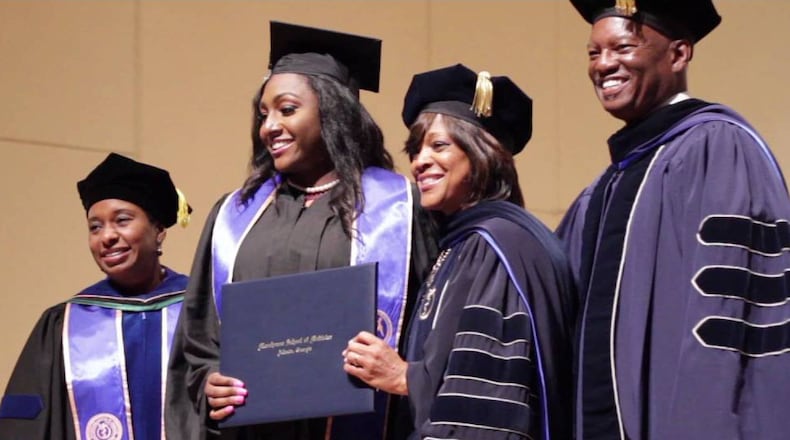Since our founding in 1975, Morehouse School of Medicine has varied significantly from other traditional academic health centers. With a specific mission to advance primary care and to work towards the elimination of health disparities, our mission has called us to serve in the most underserved and vulnerable communities. Our graduates and practicing alumni are trained to go, to meet, and to treat our patients and clients where they are.
Our doctors most typically engage patients in urban areas where others may fear to go, in rural communities where the family practitioner may be the only doctor or obstetrician within 100 miles, or in a declining suburban setting of mixed cultures and languages, filled with higher percentages of chronic health conditions and co-morbidities as well as a lack of access to care or insurance coverage. Our public health leaders connect to the community, discovering through untold stories the solutions that bridge cultural divides. Our researchers focus their discoveries to ensure the promise of science to those who are often forgotten.
On May 16, in a virtual commencement, we congratulated our most recent graduating class, who in the coming days will begin their assignments and head to postings in the field. Though there have been other public health crises in our time, none yet as infectious as this global pandemic and so doubly harmful within minority communities.
Following public health guidance as well as shelter in place orders from our state leaders, we shuttered our campus and moved to an online instruction model in late March. But just as our graduates cannot truly master their craft without touching their patients, peering through a microscope or engaging in the community, we cannot best prepare them for the challenges they are about to face without demonstrating, through our curriculum, best practices for COVID-19 testing, treatment, and contact tracing. Much of this work simply must be done in-person.
To prepare our students to best answer their calling, we will be returning to the Morehouse School of Medicine campus in a phased approach — reopening in a matter of days. We will have rigorous COVID-19 testing available for all members of our faculty, administration, and student body. Anyone testing positive will be required to follow CDC guidelines and asked to participate in contact tracing.
A recent study completed by the CDC on 305 Georgians being treated for COVID-19, found that 83 percent of the more serious cases were among African Americans. And while nationwide the black population is roughly 22 percent of our total population, where racial breakdown data is available, we are accounting for 52 percent of diagnosed cases and 58 percent of all deaths. These numbers are staggering, to say the least.
A broader sampling, with data gathering ongoing, when all races are known, finds that black men make up 33.47 percent and that black women make up 39.56 percent of positive tests. In Georgia, the overall population is 32.4 percent African American. As doctors and academicians, we know that there are many systemic challenges to health care delivery within minority communities and that the higher percentages of heart disease, diabetes, and obesity may all contribute to this disease being so deadly for African American communities.
However, we also know that social distancing is not an option for many African Americans, who represent greater than 40 percent of those who work in front-line service occupations.
Some of the most effective personal protective equipment (PPE) requires a second set of hands for best use and protection against infection. Additional bedside manner instruction is required for an illness that may present as a patient almost in recovery, and then a day later the patient is on a ventilator with calls being made for clergy. And, though our students chose to heal as to their calling, few knew this profession might potentially bring harm to themselves, their family, and their own circle of friends.
We do not make this choice lightly and we know there will be those who will question our thinking. But we must return to the classroom/clinic, our labs, and our community. There are simply many who we care for, the very people we live to serve, who need us now. And we need them.
Our mission remains to discover, to heal, to help, and to save lives. To do that, our graduates must be ready to head out the door on a moment’s notice, and to get them there, we have to be ready to do just the same.
God speed.
Dr. Valerie Montgomery Rice, M.D., is president and dean, Morehouse School of Medicine.
About the Author
Keep Reading
The Latest
Featured


